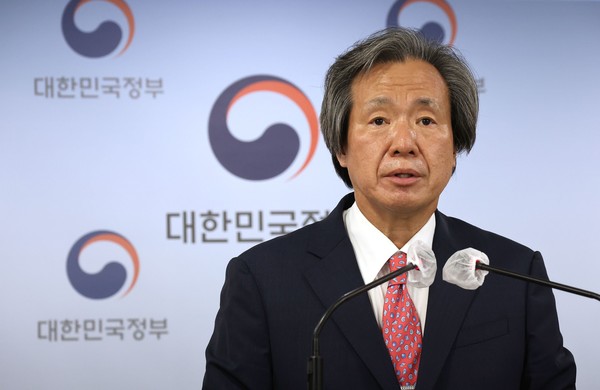Korea's top quarantine advisor predicted that the mask duty could be completely lifted after the next Covid-19 outbreak during the winter season as long as a completely new variant does not appear.

"The idea that we can take off our indoor masks next spring if there are no completely new variants has not changed yet," said Jung Ki-suck, head of the National Advisory Committee on Infectious Disease Crisis Response, during a press briefing on Monday. "The BQ.1 and BQ.1.1 variants, likely to become dominant strains during the next epidemic, are also a subvariant of BA.5."
Despite the recent increase in daily cases, Jung stressed that it is difficult to assess whether the next viral wave has begun.
"If the number of patients rapidly increases and the rate of increase continues to rise, we can say for sure that the next viral wave has begun," Jung said. However, it is currently difficult to predict whether the growth rate will rise gradually or rapidly, or how long it will stay in this state and then stagnate."
However, Jung explained that the immunity formed during the previous Omicron pandemic in March will run out in November and that an increase in cases is inevitable.
"For Korea to not see a sudden rise in the number of confirmed cases, high-risk groups should get the booster vaccines, and medical institutions across the country should work hard to prescribe Covid-19 treatments," Jung said.
Jung also ordered the quarantine authorities to closely watch the recent increase in the severe cases and fatalities tied to Covid-19.
Regarding reasons for the increase in the severe cases and fatality rate, Jung analyzed the hidden infections, an increase in the number of high-risk groups such as the elderly, a decrease in vaccination rates, and the appearance of new variants such as BQ.1 and XBB may have had an impact.
"Notably, although the detection rate of BQ.1 and BQ.1.1 among locally confirmed patients is less than 1 percent, these mutations are reported to have immune evasion ability and high transmission power, so they should be closely monitored," Jung said.
On Monday, Korea added 18,510 new Covid-19 infections, including 56 cases from abroad, bringing the total caseload to 25,557,309, according to the KDCA.
The nation also reported 18 more Covid-19 deaths, raising the death toll to 29,176. The fatality rate stood at 0.11 percent. The number of critically ill patients came to 288, up 16 from the previous day.
According to the KDCA, about 44.69 million among 52 million Koreans have been fully vaccinated. In addition, about 33.65 million people had received their first booster shots, and 7.54 million had their second booster shots.

